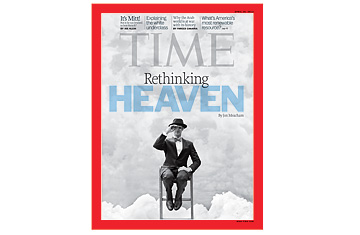
Jesus had asked the angels to sing. In the parking lot of an Arby's in North Platte, Neb., 4-year-old Colton Burpo told his father, Pastor Todd Burpo, that he'd visited heaven while undergoing appendicitis surgery. Colton had climbed into the lap of Jesus, who was dressed in a white robe with a royal purple sash. The Son of Man then summoned winged angels and requested music. There were halos and bright colors, a rainbow horse and a throne for the Son at the right hand of the Father. Colton met John the Baptist (whom he found "really nice") and saw the Virgin Mary (who was acting like "a mom" to Jesus).
Recounted in the best-selling book Heaven Is for Real (written by Lynn Vincent, who ghosted Sarah Palin's memoir Going Rogue), Colton Burpo's story has given fresh energy to a long-standing Christian view of life after death. For the Burpos, heaven is the place you go when you die.
But for some Christian leaders, the Bible points to a different view of heaven. "I don't believe we are going to be floating around with little wings looking like Cupid playing harps for all eternity," says John Blanchard, executive pastor of the 4,000-member Rock Church International in Virginia Beach and founder of Planet Rock Youth Ministries. "Heaven isn't just a place you go--heaven is how you live your life," says Blanchard, whose late father-in-law, Bishop John Gimenez, was a key figure in the rise of the religious right. "What's trending is a younger generation, teens, college-aged, who are motivated by causes--people who are motivated by heaven are also people motivated to make a positive difference in this world."
Angels and harps are all well and good, such Christians believe, but fighting HIV/AIDS is more urgent. This younger generation is driven by causes, says Blanchard, listing issues of social justice like combatting slavery and homelessness. "That's a part of being an agent of heaven on earth," he adds.
As Christians around the world prepare to celebrate Easter, a running debate about the hereafter is raising new questions about the definition of heaven--and what it says about the meaning of life. This conversation takes a subject that has occupied humanity for millennia and places it squarely amid topics of faith that are deeply relevant today. Even in the wake of the Enlightenment and the scientific revolution, many of us believe in heaven--85% of all Americans, according to Gallup. Most of us are apparently confident--or at least say we are--that life does not end at the grave.
Yet we don't necessarily agree on what heaven is. There is, of course, the familiar image recounted by Colton Burpo. But there is also the competing view of scholars such as N.T. Wright, the former Anglican bishop of Durham, England, and a leading authority on the New Testament. What if Christianity is not about enduring this sinful, fallen world in search of a reward of eternal rest? What if the authors of the New Testament were actually talking about a bodily resurrection in which God brings together the heavens and the earth in a wholly new, wholly redeemed creation? As more voices preach a view that's at odds with the pearly gates (but supported, they note, by Scripture), faithful followers must decide which approach they believe in.
